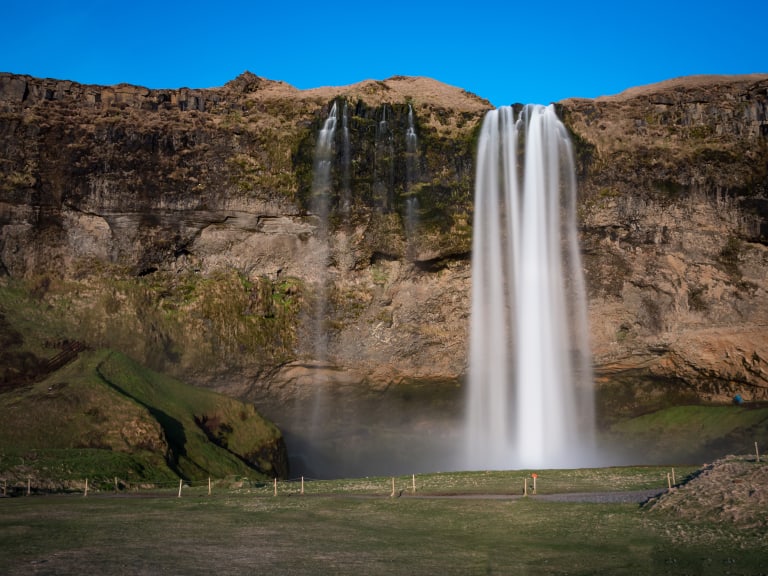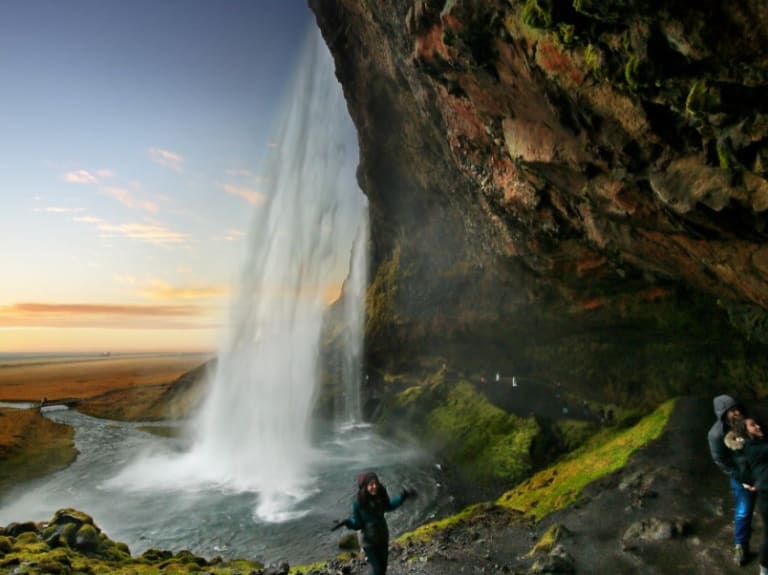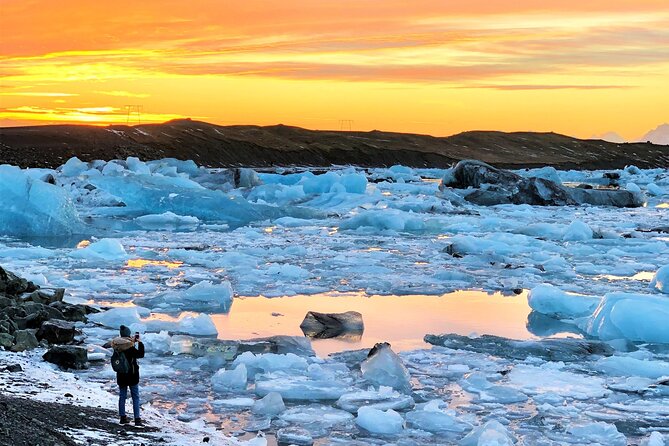More about: Seljalandsfoss Waterfall Day Trips in Iceland
Iceland is famous for its beautiful landscapes, but also for its wide range of adventure experiences. Whale watching, geyser tours, helicopter tours: there are thousands of things to see and do in Reykjavik and the surrounding area.
This article focuses on one specific attraction: the Seljalandsfoss waterfalls. They are located a short distance from a main road and are therefore one of the most visited attractions on the island.

South Coast Glaciers and Waterfalls Day Trip from Reykjavik
Explore glaciers and waterfalls on Iceland's south coast
Discover Iceland's most stunning natural gems on a 10-hour guided tour with transport included from Reykjavik.
With this excursion to the south coast of Iceland from Reykjavik, you will experience one of the most breathtaking scenic routes in the country. For around 10 hours, a local guide will take you on a tour of glaciers, volcanic beaches, spectacular waterfalls and charming fishing villages.
You'll be able to access Seljalandsfoss waterfall and walk behind its curtain of water to take unique photos. You'll also visit the powerful Skógafoss waterfall, the Skógar folklore museum with over 15,000 artefacts, and the Sólheimajökull glacier, which forms a fascinating glacial lagoon.
The tour also includes Reynisfjara black sand beach with its basalt columns and rock formations, as well as a stop in Vik, the picturesque village surrounded by volcanic cliffs. During the journey, you will enjoy incredible views of the Mýrdalsjökull glacier.
Transport is by comfortable coach with free Wi-Fi from selected hotels in Reykjavík.
Recommended if... you want to spend a full day in contact with Icelandic nature, combining glaciers, volcanoes, waterfalls and charming villages without worrying about logistics.
What is the south coast tour with a stop at Seljalandsfoss like?

These tours cover the southern part of the island and include a stop at Seljalandsfoss waterfall. The tour usually stops here for about half an hour and is the last stop before returning to Reykjavik.
Before reaching the waterfalls, the vehicle stops at:
- Hekla, Iceland's most active volcano. Its regular eruptions have earned it the nickname "Gateway to Hell". Despite its terrifying name, it is not uncommon to see beautiful Icelandic horses in the surrounding area. They are different from their European counterparts: they are small, strong and very affectionate. If you'd like to meet them, I recommend reading the article on the best horse riding tours in Iceland.
- Reynisfjara, a striking black sand beach with a cliff of basalt columns. It is so beautiful that it looks fake! The Atlantic puffin nests in this splendid setting. These small black birds with white breasts are much loved and there are excursions to see them up close. One of these is the Puffin Cruise from Reykjavik
- Skógafoss, the waterfall that hides a treasure. According to local folklore, the sailor Thrasi hid his chest here and never returned to retrieve it
- Eyjafjallajokull, the volcano with the unpronounceable name that kept the whole of Europe in check. Its last eruption took place in 2010 and covered the skies of the old continent with a layer of ash. If you are not very young, you may remember that planes did not take off for a week
- Solheimajokull, the most beautiful glacier in the south. It is also one of the easiest glaciers to reach from Reykjavik.
Normally, these routes include a stop at Víkurskáli, a mini market where you can buy something for lunch: soups, cheeses, sausages, biscuits, etc. The stop usually lasts an hour.
More information
- Price: approximately £80
- Duration: 10 hours
- Starting point: the vehicle will pick you up at your hotel or at a central point in Reykjavík
Another option: Excursion to Seljalandsfoss, Skógafoss, black beach and Solheimajokull

At first glance, this route is the same as the first one. Indeed, the differences are minimal, but there is one place that you will only get to see if you choose this second option: Vík í Mýrdal, a picturesque village overlooking the sea. It is not only an evocative place, but also a stop to refuel, rest and grab a bite to eat.
Its icon is the minimalist (and very photogenic) red and white church that dominates the town centre from a small hill. If you have time, you can enjoy a pint and a burger at the Strondin pub (Austurvegur 18).
More information
- Price: approximately £80
- Duration: 10 hours
- Starting point: from your hotel
How to get to Seljalandsfoss waterfalls on your own

The waterfall is located on the south coast of the island, about 120 kilometres from Reykjavík. If you don't want to book an organised tour, you have only one option: by car. Buses only connect cities and towns and do not usually stop near natural attractions.
This is not a problem, as both the airport and the capital are home to the main rental agencies (Europcar, Hertz, Sixt, etc.). The waterfall is located right next to the Ring Road and the journey takes just under 2 hours. One last thing, before booking a vehicle, you should keep a few tips in mind:
- Consider renting a 4x4, especially if you plan to explore the more remote areas.
- Extend your insurance coverage. Most of the roads are gravel, and a small rock can damage the bodywork or, even worse, the windscreen.
- Don't wait too long to refuel. Outside the capital, petrol stations are few and far between. Fortunately, there is an N1 petrol station near Seljalandsfoss (PQX8+RFM, Þjóðvegur, 860 Hvolsvöllur, Iceland).
- Respect the speed limits. The main road (Ring Road) is full of speed cameras. As if that weren't enough, sheep and horses often wander onto the road.
When is the best time to take a trip to the waterfalls?

There are two schools of thought: some believe that the best time is winter, while others consider that it is worth visiting the waterfalls from late May to early July, when the water flow is more consistent and there is a better chance of seeing the Northern Lights.
However, the colder months have one advantage: snow. The contrast with the dark rocks and the stalactites of solidified water create a very evocative atmosphere.
Unfortunately, you cannot walk behind the waterfall. The path is too slippery and the authorities have no choice but to close it.
Despite the low temperatures, the waterfalls do not freeze completely. As it falls from the top of the cliff, the water makes its way between frozen banks covered with a beautiful white layer.
If you are travelling to Reykjavik in winter, you will be pleased to know that the roads leading to Seljalandsfoss are cleared regularly. In any case, you can check the status of the Ring Road (the motorway that circles the island) and other roads on the Road.is website.
How long is it worth staying in Seljalandsfoss?

In general, half an hour is enough. Unlike other natural attractions in the country, this waterfall is easily accessible by car and there is no real hiking trail.
Most tourists come here, take some photos, hang around for a while and then leave. If you're looking for something longer, you can book a tour to the Blue Lagoon from Reykjavik or a visit to Thingvellir National Park.
Book a tour to the Blue Lagoon from Reykjavik
How should I dress?

A nature excursion always involves a little challenge. You have to be ready for anything, and the best advice is always the same: dress in layers. To simplify things, I've divided the suggestions into two points.
Summer clothing
In Iceland, summer begins in June and ends in late August. The days are very long: the sun rises very early and the sunset seems to never come. As for temperatures, the minimum is around 10º, while the maximum is around 20º. The weather is very changeable and, as always, requires a variety of clothing:
- Breathable, water-repellent trousers (not too heavy or you'll get hot)
- Hiking boots
- Short-sleeved and long-sleeved T-shirts (for two layers)
- Light coat
- Windbreaker jacket with hood
- Ear muffs
- Sunglasses
If this is your first time in Iceland, it might be better to choose this season. For more information, I recommend the article explaining what to do in Reykjavik in summer.
Winter clothing
The cold season usually starts in November and ends in early April. Contrary to what you might think, temperatures are not extreme. In Reykjavik, the minimum temperature does not drop below -5º, while the maximum reaches "highs" of 3º/5º.
However, the wind is constant and increases the feeling of cold. To avoid suffering, you should pack your suitcase carefully. The list below outlines the essentials:
- Thermal underwear made of merino wool or polypropylene; cotton is best avoided
- Trekking shoes or waterproof winter boots
- Waterproof and windproofski trousers
- Neck warmer, more practical than a scarf
- Woolly hat
- High-qualitywinter jacket
- Fleece coat
- Ski gloves and touchscreen gloves
If you're travelling at this time of year, take the opportunity to buy a Lopapeysa, the island's warm jumper. You'll find a good selection at the Handknitting Association of Iceland (Skólavörðustígur 19) or the Kolaportið Market (Laugavegur 12).
Is it possible to swim at Seljalandsfoss?

Technically, you can, but it's not a good idea. The impact of the water is too strong, and I'm sure you don't want to find out the consequences. If you want to take a dip, I recommend visiting the best hot springs in Iceland. You'll feel reborn!
Do I need travel insurance to visit Seljalandsfoss?

A trip to the waterfalls is fairly straightforward: it doesn't require too much effort and there are no major dangers. However, Iceland is an adventure destination and the unexpected is always lurking. Without travel insurance, a sprained ankle or an infection could become a headache (metaphorically speaking).
The northern country does not belong to the European Union and the EU card is only valid to a certain extent. Icelandic citizens are required to pay 15% of any healthcare costs, and if you don't take out additional insurance, you will be subject to the same treatment.
In short: it's worth spending a little more to travel with peace of mind. This way, you can throw yourself into all the adrenaline-fuelled activities you fancy: horse riding tours from Reykjavik, hiking through ice caves, mountain biking and much more.
Are there any bars or restaurants near the waterfalls?

No, Seljalandsfoss is close to the road but there are no major towns or cities nearby. Whether you're travelling alone or on an organised tour, I recommend bringing food and/or drink from the capital. In Reykjavik, the main supermarkets are:
- Bonus, the cheapest on the island. Don't go there if you want to do a big shop because the selection is limited.
- Hagkaup, a little more expensive but with supermarkets open 24/7
- Iceland, the ideal destination if you have a sweet tooth. At the weekend, there is a pick and mix option that guarantees a 50% discount on these products.












